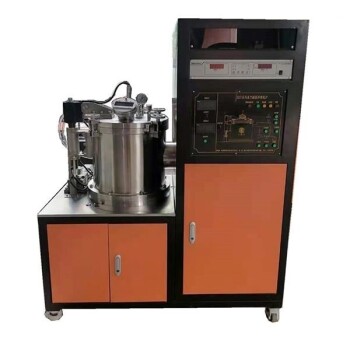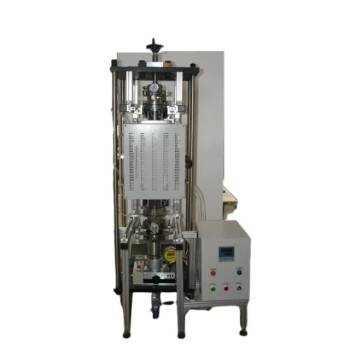Diffusion pumps are a type of vacuum pump widely used in applications requiring high vacuum levels. They operate without moving parts, relying on the diffusion of gas molecules into a high-speed vapor jet to create a vacuum. Their primary applications include scientific research, semiconductor manufacturing, and industrial processes where ultra-high vacuum conditions are essential. Diffusion pumps are valued for their reliability, efficiency, and ability to achieve extremely low pressures. Below, we explore their key applications in detail, focusing on their role in various industries and processes.
Key Points Explained:

-
Scientific Research and Laboratory Applications
- Diffusion pumps are extensively used in laboratories for experiments requiring high or ultra-high vacuum conditions.
- Examples include:
- Particle physics experiments: Creating vacuum environments for particle accelerators and detectors.
- Surface science studies: Analyzing material surfaces under controlled vacuum conditions.
- Space simulation chambers: Mimicking the vacuum of space for testing satellites and spacecraft components.
- Their ability to achieve pressures as low as 10^-10 Torr makes them ideal for precision research.
-
Semiconductor and Electronics Manufacturing
- In the semiconductor industry, diffusion pumps are critical for processes such as:
- Thin-film deposition: Creating layers of materials on silicon wafers under vacuum.
- Etching and lithography: Ensuring clean, particle-free environments for microfabrication.
- Ion implantation: Embedding ions into semiconductor materials to alter their electrical properties.
- The high vacuum levels provided by diffusion pumps ensure the purity and precision required for producing microchips and electronic components.
- In the semiconductor industry, diffusion pumps are critical for processes such as:
-
Industrial Manufacturing and Processing
- Diffusion pumps are employed in various industrial applications, including:
- Vacuum coating: Applying thin films to materials for improved durability, reflectivity, or conductivity.
- Degassing: Removing trapped gases from liquids or materials, such as in the production of optical fibers.
- Freeze-drying: Preserving perishable goods by removing moisture under vacuum conditions.
- Their reliability and efficiency make them suitable for continuous operation in demanding environments.
- Diffusion pumps are employed in various industrial applications, including:
-
Medical and Analytical Instrumentation
- Diffusion pumps are integral to the functioning of advanced medical and analytical equipment, such as:
- Electron microscopes: Maintaining vacuum conditions for high-resolution imaging.
- Mass spectrometers: Enabling precise analysis of chemical compositions.
- X-ray photoelectron spectroscopy (XPS): Studying the surface chemistry of materials.
- These applications rely on the pump's ability to maintain stable, high vacuum levels for accurate results.
- Diffusion pumps are integral to the functioning of advanced medical and analytical equipment, such as:
-
Space and Aerospace Applications
- Diffusion pumps are used in the aerospace industry for:
- Testing spacecraft components: Simulating the vacuum of space to ensure durability and performance.
- Satellite manufacturing: Creating vacuum environments for assembling and testing satellite systems.
- Propulsion system testing: Evaluating rocket engines and other propulsion technologies.
- Their ability to achieve ultra-high vacuum conditions is critical for replicating the space environment.
- Diffusion pumps are used in the aerospace industry for:
-
Advantages of Diffusion Pumps in These Applications
- No moving parts: Reduces wear and tear, ensuring long-term reliability.
- High vacuum levels: Capable of achieving pressures as low as 10^-10 Torr, making them suitable for ultra-high vacuum applications.
- Efficiency: Provides consistent performance with minimal maintenance.
- Cost-effectiveness: Lower operational costs compared to other high-vacuum pumps.
In summary, diffusion pumps are versatile and essential tools in industries requiring high or ultra-high vacuum conditions. Their applications span scientific research, semiconductor manufacturing, industrial processing, medical instrumentation, and aerospace testing. Their unique design and performance characteristics make them indispensable for achieving the precise vacuum levels needed in these fields.
Summary Table:
| Application | Key Uses |
|---|---|
| Scientific Research | Particle physics, surface science, space simulation chambers |
| Semiconductor Manufacturing | Thin-film deposition, etching, ion implantation |
| Industrial Processes | Vacuum coating, degassing, freeze-drying |
| Medical Instrumentation | Electron microscopes, mass spectrometers, XPS |
| Aerospace Testing | Spacecraft component testing, satellite manufacturing, propulsion testing |
| Advantages | No moving parts, high vacuum levels, efficiency, cost-effectiveness |
Need a diffusion pump for your high-vacuum application? Contact our experts today to find the right solution!









